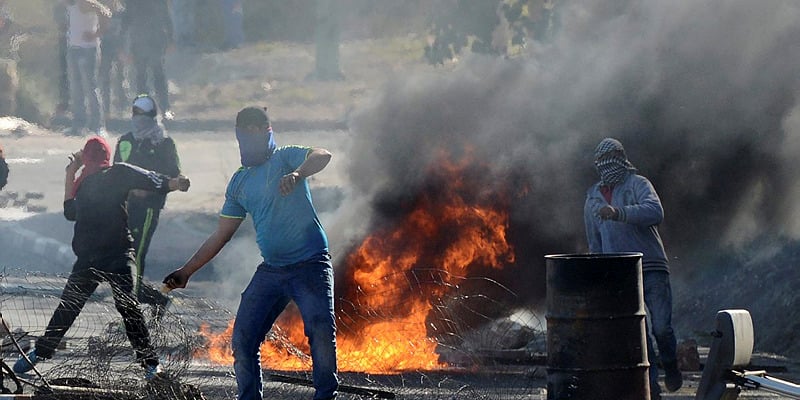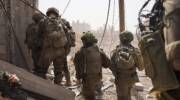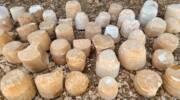The organization’s track record and current actions reveal a troubling policy of violence, obstruction and instigation.
By Hadar Tennenberg, HonestReporting
The West Bank (Judea and Samaria) is no stranger to violent riots. Friday afternoon clashes in particular have long been a fixture of the region. Amid the fog of such violence, it can be difficult to ascertain facts.
However, unlike its enemies, who rush to establish conclusions and assert widely inflated casualty figures within minutes of an incident, the IDF takes the time to carefully review each situation, adhering to a policy of investigation and accountability stemming from a respect for human life and the heavy responsibility of attributing guilt.
This commitment has led the IDF to take responsibility where such investigations reveal fault, like in the case of Shireen Abu Akleh– and have brought truth to heavily contested matters- such as with the Al-Ahli hospital incident, where the IDF’s findings revealed a casualty size approximately one-fifth of Hamas’ lie, and the cause of a misfired Palestinian Islamic Jihad rocket- in the hospital parking lot.
The case of Turkish-American activist Aysenur Ezgi Eygi, killed during clashes in Beita near Nablus, is no different. Eygi’s death is a tragedy, as is any civilian loss, and the IDF is currently investigating the circumstances.
Yet, unsurprisingly, immediate accusations have been levied against the IDF. The anti-Israel organization Eygi belonged to, the International Solidarity Movement (ISM), claims the shot that killed Eygi was “intentional”, while headlines like AP’s “Israeli Soldiers Fatally Shot an American Woman at a West Bank Protest, Witness Says”, quickly confirm the narrative, leaving little room for ambiguity and framing pesky details like ‘truth’ and ‘sources’ as inconveniences in an otherwise catchy title. This is the latest in an enduring pattern of the media spreading information without adequate investigation (see: the insistent belief in Hamas’ infamous fabrication of 40,000 civilian deaths, which even the UN now admits is false).
What we know so far about the Beita clash is incomplete. The IDF says troops responded with fire to a violent instigator hurling rocks at soldiers (a common occurrence during these events, which often see escalations involving rioters hurling burning tires, boulders and Molotov cocktails), and are looking into reports of a foreign national being killed as a result.
Meanwhile, the ISM claims the demonstration was peaceful, primarily involving prayer before being met with IDF force. This narrative creates a strange gap in the story (why would the IDF suddenly respond to praying?) that can be answered in the firsthand account of Jonathan Pollak, who acknowledges that “clashes erupted”- a situation that implies escalation and violence on two sides.
While the ISM vehemently denies “false claims” that their own members threw rocks at soldiers, their long-standing presence at these Friday riots and other flashpoints suggests a more complex reality. Anyone purposely placing themselves in a volatile environment prone to escalation may, unfortunately, become an unintended victim. In the words of ISM co-founders Adam Shapiro and Huwaida Arraf, “The Palestinian resistance must take on a variety of characteristics, both non-violent and violent…Yes, people will get killed and injured”.
In March 2003, ISM activist Rachel Corrie was killed by a bulldozer she placed herself in front of, which was operating near the Rafah border crossing to prevent illegal weapons from being smuggled in by terrorists from Egypt. Numerous investigations, as well as the final Haifa District Court ruling, confirmed that the driver of the bulldozer did not see Corrie, and her death, though tragic, was unintentional and caused by her own negligence. Recklessly placing yourself in a war zone tends to have that effect.
While Corrie became a martyr, the court ruling may have unintentionally awarded too much good faith to ISM’s actions. Corrie’s death reveals a broader pattern of ISM’s encouragement to its activists to put themselves in harm’s way. As AP states, “ISM activists often place themselves between Israeli forces and Palestinians to try to stop the Israeli military from carrying out operations”.
An in-depth review of the ISM by the Meir Amit Intelligence and Terrorism Information Center paints a clear picture of their true actions and goals. During the Second Intifada, ISM volunteers specializing in hindering IDF counterterrorism operations and aiding terrorists began arriving in Israel. Their activities included “… serving as human shields for terrorist operatives wanted by the Israeli security forces, locating themselves near IDF roadblocks throughout Judea and Samaria, providing the Palestinians (including terrorist operatives and their families) with financial, logistic and moral support, hindering the razing and sealing of houses of suicide bombers, and holding protests along the security fence.”
The ISM even sent members to “serve as human shields at the entrances to the Church of the Nativity in Bethlehem and to Arafat’s headquarters in Ramallah”.
In more alarming examples revealed in the report, senior Islamic Jihad terrorist Shadi Sukiya was arrested while hiding in ISM’s Jenin office in 2003, being assisted by two ISM activists. In 2008, ISM member Richard David Hupper was convicted by a U.S. federal jury of “giving about $20,000 to Hamas while working in Israel with the International Solidarity Movement.”
This entanglement with terrorist networks is one piece of a broader network of organizations providing cover for terrorist activities. Four senior American ISM members went on to form the international pro-Hamas umbrella organization, the Free Gaza Movement (FGM), whose most notable effort was the Gaza flotilla, led by the pro-Hamas Turkish organization IHH, whose objective was to strengthen Hamas rule in the Gaza Strip. The flotilla ended in a violent confrontation with IDF soldiers in May 2010.
Senior ISM figures have likewise justified Palestinian armed violence, even during the height of suicide bombings. On October 8, the organization tweeted justifying the horrific Black Saturday massacre, blaming the “violence of the oppressor.” It also released a statement blaming Israel for every single death, while the co-founder of the ISM Northern Californian branch Paul Larudee praised his Palestinian brothers and sisters for “teaching a lesson to the Zionists”. Larudee has also been linked to Hamas.
Interestingly, the Meir Amit Center’s methodology involved a critical comparison of ISM’s publicly available materials to its actual operations and internal documents. Internal ISM publications and training manuals not meant for public release revealed workshops ISM activists participated in, which included legal and security briefings on how to deceive Israeli authorities (e.g., altering passport details). This deliberate misdirection in their intentions, hidden under proclamations of “non-violence”, serves the ISM well during incidents like that Eygi’s death.
A far cry from its stated principles of peaceful solidarity and bearing witness, the ISM’s founding members’ ideology and statements, the organization’s track record, and current actions reveal a troubling policy of violence, obstruction and instigation. Tragically, in the case of Aysenur Ezgi Eygi, this same pattern is at play.
The ISM’s fraudulent intentions and dangerous presence at volatile flashpoints like Beita only heighten tensions, encouraging protesters and making it more difficult for Israeli security forces to act without escalation, while leaders’ statements and leaked documents make it clear that this was the goal all along.
However, despite the ISM’s incitement, purposeful use of human shields, and the hazy and dangerous conditions of the current war, at the very least one can rest easy in the fact that at least one actor in this situation does their due diligence, conducts investigations and takes accountability.
Meanwhile, we can only hope outside actors cease to escalate the violence people who live in this country are forced to face every day.
Do You Love Israel? Make a Donation - Show Your Support!
Donate to vital charities that help protect Israeli citizens and inspire millions around the world to support Israel too!
Now more than ever, Israel needs your help to fight and win the war -- including on the battlefield of public opinion.
Antisemitism, anti-Israel bias and boycotts are out of control. Israel's enemies are inciting terror and violence against innocent Israelis and Jews around the world. Help us fight back!























